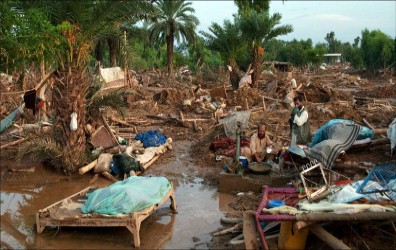On 28-29 June, GWP Pakistan organised a conference in collaboration with the Japan International Cooperation Agency (JICA), UNESCO, and the International Center for Integrated Mountain Development (ICIMOD). The conference was part of a major project, initiated by UNESCO, with the aim to upgrade flood forecasting and early warning systems along the Indus River. The project is being carried out in cooperation with the Government of Japan, and GWP Pakistan helped organize several training workshops connected to the project.
Ahsan Iqbal, Pakistan’s Minister for Planning and Development, attended the conference and warned that the country is facing a water management crisis. He stated that there is no water scarcity in Pakistan – the problem is that water resources are not managed properly. “Pakistan has water storage capacity of only seven per cent of total available water in the country, which needs to be improved", he said, according to Associated Press of Pakistan (APP).
According to the minister, the per capita water availability in Pakistan was 5000 cubic meters when the country was created, while in the near future it would be as low as 800 cubic meters per capita. “I hope that with the help of experts we can help solve these problems”, Ahsan Iqbal said.
Problems and priorities
The main water issues in Pakistan have been identified to lie both in hardware (development) and software (management) and these must be addressed with equal priorities.
The limited storages are being adversely affected by sedimentation. The existing hydraulic infrastructure suffers from deferred maintenance. The Indus Basin, itself being the largest single contiguous irrigation system, is not fully integrated and this leads to serious inter-provincial water disputes.
Pakistan can be classified as one of the most arid countries of the world, with an average rainfall of 240 mm a year. Its population and economy heavily depends on the annual influx into the Indus System (including the Indus, Jhelum, Chenab, Kabul and some un-captured flows by India of Ravi, Sutlej and Beas rivers) of about 190 BCM of water, mainly derived from snow melting in the Himalayas.
77% of Pakistan’s population is located in the Indus basin, and 40 million people depend on irrigation water for their domestic use, especially in areas where groundwater is brackish.
Photo: In 2010 a major flood devastated Pakistan.

